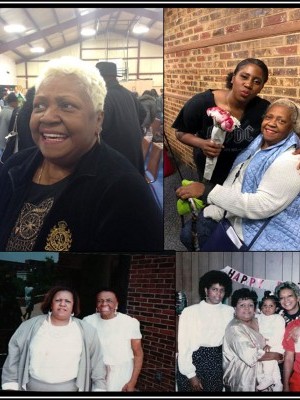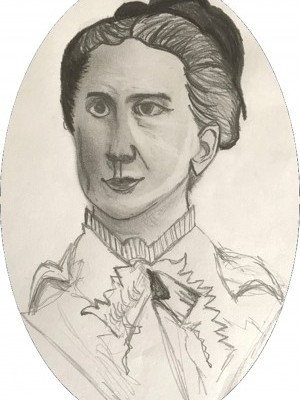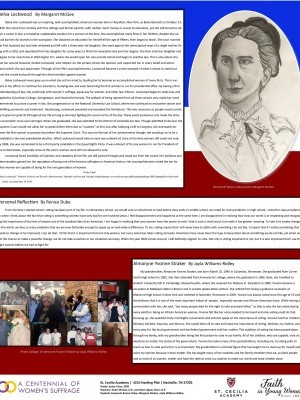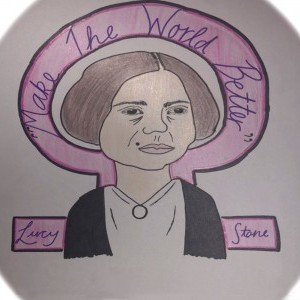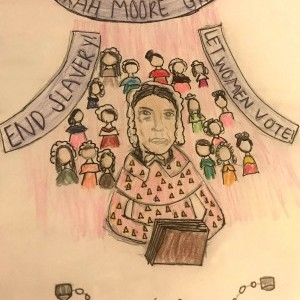Jayla Williams-Ridley, Margaret McGee & Ronice Dube
St Cecilia Academy | Nashville, TN | 11th Grade
Inspirational Family Member
Jayla's Grandmother
My grandmother, Almaryne Yvonne Straker, was born March 25, 1945 in Columbia, Tennessee. She graduated from Carver Smith High School in 1962. She then attended Fisk University for college, where she graduated in 1966. Next, she travelled to Antioch University IOE in Cambridge, Massachusetts, where she received her Masters in Education in 1980. Yvonne became a counselor at Mattapan State in Boston and in private opiate detox centers. She retired from being a guidance counselor at Malverne High School in New York and resettled in Nashville, Tennessee in 2009.
Yvonne has always voted since the age of 19 and she believes that it is one of the most important values, especially for women and African-Americans to have. While having a conversation with her, she said, " Too many people died for the right to vote and were killed," so that is why she has voted during every election. Being an African-American woman, Yvonne felt like her voice needed to be heard and only voting could do that.
Growing up, she watched many Civil Rights movements and activists speak on the importance of voting. Yvonne had four children, Michael, Michele, Maurice, and Marcus. She raised them all to vote and know the importance of voting. Michele, my mother, votes every year for the local government and the federal government with her mother. This tradition of voting has been passed down through my family, with my grandmother being the first person to vote in our family. All of her children, who are capable, vote at all elections no matter the status of the government. Yvonne has taken many of her grandchildren, including me, to voting polls to teach us how to vote and why it is so important.
My grandmother is a female figure that has taught me to stand up for myself and voice my opinion because it does matter. She has taught many of her students and her family members that we as black people and as most of us women, matter, and have the right to voice our opinion to make our world and state a better place.
Historical Figure I Admire
Belva Ann Lockwood
Belva Ann Lockwood was an inspiring, well-accomplished, American woman born in Royalton, New York, as Belva Bennett, on October 24, 1830. She came from a family with five siblings and farmer parents, with neither much money nor access to education; yet she still strived to obtain a career in law, a somewhat unattainable position for a woman at the time. She accomplished many firsts in her lifetime, despite the cultural barriers for women in the workplace. She obtained an education for herself till the age of fifteen, then began to teach. She soon married her first husband but was later widowed and left with a three-year old daughter. She went against the stereotypical ways of a single mother living with a child, and separated from her daughter for some years to finish her education and earn her degree. She then took her daughter and degree to her new home in Washington, D.C., where she would open her own private school and begin to practice law. This is also where she met her second husband, Ezekiel Lockwood, who helped run the private school she opened, and supported her in every belief and action about which she was passionate. Through all her life's accomplishments, Lockwood became a prime example of what it meant to stand out from the crowd and push through the discrimination against women.
Belva Lockwood never gave up on what she set her mind to, leading her to become an accomplished woman of many firsts. This is evident in her efforts to continue her education, studying law, and even becoming the first woman to run for presidential office. By having a firm understanding of law, she could help with women's suffrage, equal pay for women, and other law reforms. Lockwood began to study law, and applied to Columbian College, Georgetown, and Howard University. The setback of being rejected from all three schools only made her more determined to pursue a career in law. She progressed on to the National University Law School, where she continued to encounter sexism and belittling comments and treatment. Headstrong, Lockwood prevailed and exceeded the limitations. This was necessary as people would continue to give her grief all throughout her life as long as she kept fighting the social norms of the day. These sexist exclusions only made the drive to accomplish more even stronger. When she graduated, she was admitted to the District of Columbia bar test. Though admitted to the bar, the Supreme Court would not allow her to speak before them due to "customs" at first, but after lobbying a bill to Congress, she eventually became the first woman to practice law before the Supreme Court. This was not the last of her achievements though; she would go on to be a candidate in the next presidential election. What Lockwood would take on next was unheard of since at the time women still could not vote. By 1884, she was nominated to be a third-party candidate in the Equal Rights Party. It was unheard of for any woman to run for President of the United States, especially since at this point, women were still not allowed to vote.
Lockwood faced hardships of rejection and obstacles all her life, yet still pushed through and stood out from the crowd. Her boldness and determination gained her the reputation of being one of the bravest suffragists in American history. Her accomplishments raised the bar for what women are capable of doing for the next generation of women.
SOURCES +
What the Project Means to Me
From the time I started school, voting has been part of my life. In elementary school, we would vote on what book to read before class ends. In middle-school, we voted for club presidents. In high school, I voted for class presidents. So when I think about the fact that voting is something women have only had for one hundred years, I feel disappointment and happiness at the same time. I am disappointed at realizing how slow our world is at respecting and recognizing the importance of the lives of anyone out of the standard idea of an American. I am happy in realizing that now women have the power to vote. Vote is such a small word, but really it has greater meaning. To vote is to create change. In the world, we face so many problems that we are now fortunate enough to speak up on and make a difference. To me, voting means that I will never have to settle with something I do not like. It means that if I notice something that needs to be changed or improved, I can do that. I think that it is important that not only women, but every American takes voting seriously. Americans have never been the type to keep silent about something we do not like, yet when we get the chance to make a peaceful change, we do not take ourselves or our situations seriously. When the year 2020 comes around, I will definitely register to vote. Not only is voting important to me, but it is also important that I use the right women before me had to fight for.
Explore the Archive
More From This Class
Click on the thumbnails below to view each student's work.Deadline Extended
There's still time to join Women Leading the Way.
Become a part of our storytelling archive. Enroll your class today.
Join the Project

